Guidance Material
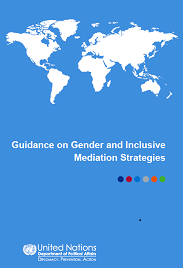
This UN DPA, now DPPA guidance seeks to inform mediators and their teams, as well as conflict parties, about the principles and strategies for the effective inclusion of women, as well as a gendered perspective in mediation processes. The guidance addresses mediation preparation, inclusive process design, and substantive issues including security arrangements, participation, constitutions, as well as language and the implementation of peace agreements through a gender lens.
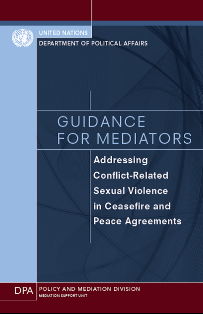
The United Nations requires its mediators to address conflict-related sexual violence. This guidance offers mediators and their teams principles and strategies for including this critical peacebuilding and security concern in ceasefire and peace agreements.
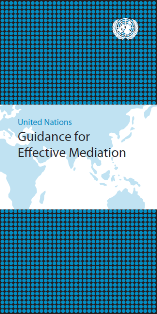
The Secretary-General developed the United Nations Guidance for Effective Mediation in response to a request from the General Assembly (A/RES/65/283). The Guidance identifies a number of key fundamentals that should be considered in mediation processes: preparedness; consent; impartiality; inclusivity; national ownership; international law and normative frameworks; coherence; coordination and complementarity of the mediation effort; and quality peace agreements.
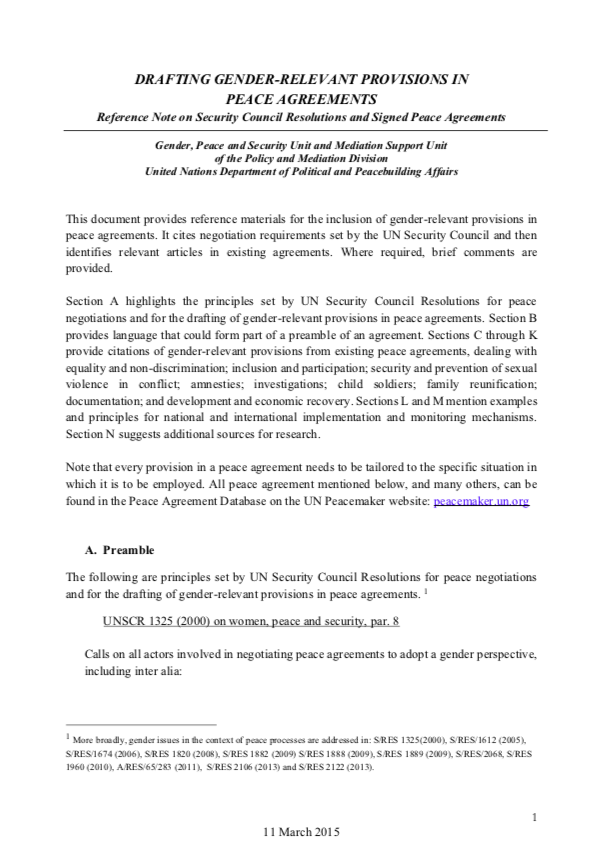
This document provides reference materials for the inclusion of gender-relevant provisions in peace agreements. It cites negotiation requirements set by the UN Security Council and then identifies relevant articles in existing agreements. Where required, brief comments are provided.
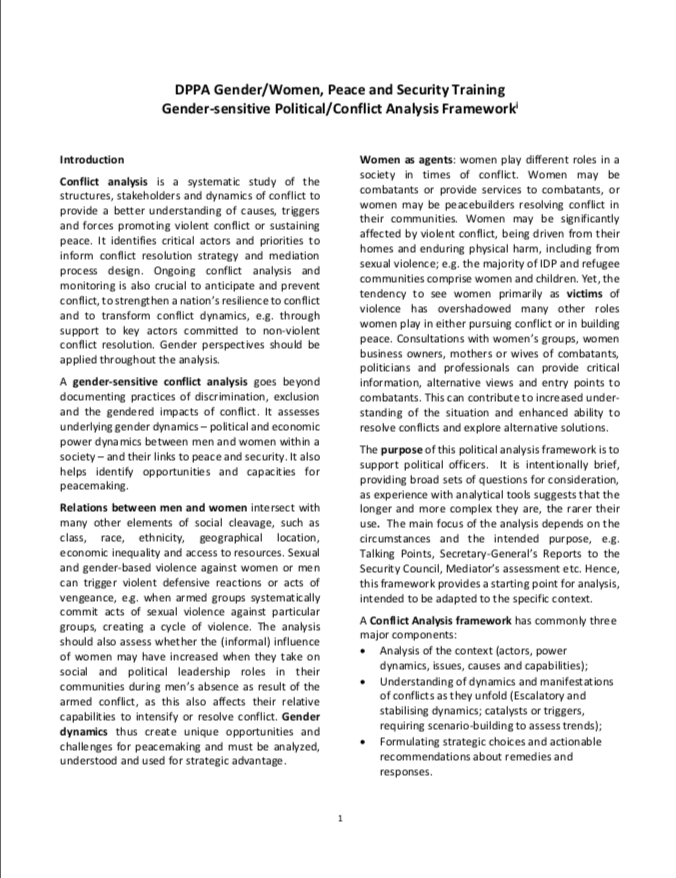
Conflict analysis is a systematic study of the structures, stakeholders and dynamics of conflict to provide a better understanding of causes, triggers and forces promoting violent conflict or sustaining peace. It identifies critical actors and priorities to inform conflict resolution strategy and mediation process design. Ongoing conflict analysis and monitoring is also crucial to anticipate and prevent conflict, to strengthen a nation's resilience to conflict and to transform conflict dynamics, e.g. through support to key actors committed to non-violent conflict resolution.
Following a review, in 2023, GPS issued a revised DPPA WPS Policy. The new Policy maintains the same priority areas, but with updates to reflect key developments and new areas of work, including digital technology and climate, peace and security. The Department continues to develop policy on the intersection of WPS and other relevant issues, such as Youth, Peace and Security, and to consider the gendered implications of evolving technologies and the risks of hate speech and mis- and disinformation.
Resources
Websites
WPS Dashboard on UN Women's Data Hub
Gender Expertise in Special Political Missions
Inclusion of Gender Provisions in UN-mediated Peace Agreements
Representation of Women in Formal UN-led and co-led Peace Negotiations
Publications
United Nations:
UN DPPA, UN DPO, UN Women (2024), How the UN System Can Advance Tangible Results on Women’s Participation in Peacemaking, Peacekeeping, and Peacebuilding by 2030, New York: United Nations
UN DPPA (2022), Weathering Two Stoms: Gender and Climate in Peace and Security, New York: United Nations DPPA.
UN DPPA (2021), Women Peace and Security (WPS) & Youth Peace and Security (YPS) Complementarities of the two agendas, New York
UN DPPA (2020), From Words to Action: The Experience of UN Political Missions in Colombia on Women, Peace, and Security. Available in Spanish here. [50 pages] Executive Summary - From Words to Action: The Experience of UN Political Missions in Colombia on Women, Peace, and Security [8 pages]
UN DPPA (2020), Opening the Doors to Women's Meaningful Participation, New York: United Nations. [7 pages] Poster also available.
UN DPPA and UN Women (2020), COVID-19 and Conflict: Advancing Women's Meaningful Participation in Ceasefires and Peace Processes, New York: United Nations. Available in Arabic | French | Russian | Spanish.
Bell, Christine (2018), Accessing Political Power: Women and Political Power-Sharing in Peace Processes, New York: UN Women. Available in Arabic here. [28 pages]
Jamar, Astrid and Christine Bell (2018), Transitional Justice and Peace Negotiations with a Gender Lens, New York: UN Women. Available in Arabic here. [35 pages]
Pospisil, Jan and Christine Bell (2018), ‘Securing’ Peace: Women and Security Arrangements in Peace Processes, New York: UN Women. Available in Arabic here. [28 pages]
Suteu, Silvia and Christine Bell (2018), Women, Constitution-Making and Peace Processes, New York: UN Women. Available in Arabic here. [32 pages]
UN Women (2018) Experts Group report on women’s meaningful participation in peace processes and gender-inclusive peace agreements, New York: UN Women. [72 pages]
UN Women and IPTI (2018), Examples of modalities to support women’s representation and influence in peace negotiations (Version 1: August), annexed to: UN Women (2018) Experts Group report on women’s meaningful participation in peace processes and gender-inclusive peace agreements, New York: UN Women. Forthcoming in Arabic.
Wise, Laura and Christine Bell (2018), Gaining Ground: Women and Territorial Power-Sharing in Peace Processes, New York: UN Women. Available in Arabic here. [24 pages]
Paffenholz, Thania et al. (April 2016). Making Women Count - Not Just Counting Women: Assessing Women’s Inclusion and Influence on Peace Negotiations, New York: UN Women and IPTI. [60 pages]
Others:
Kapur, Bela and Ola Saleh (2020), A Right Not a Gift – Women building feminist peace, Kvinna till Kvinna. [72 pages]
Landau, Dana and Andreas Hirblinger (2020), Strategies of inclusion in peacemaking: Beyond box-ticking and photo opportunities?
Bell, Christine and Kevin McNicholl, (2019), Principled Pragmatism and the ‘Inclusion Project’: Implementing a Gender Perspective in Peace Agreements, Feminists@Law.
ICAN (2019), 10 steps to ensure gender-responsive processes and ceasefire agreements, Washington DC: ICAN [2 pages]. Arabic version available here.
CMI and SIPRI (2018), Beyond ‘women’s issues’ and smoky rooms: Debunking the myths about gender in peace mediation. SIPRI Commentary [3 pages]
Dayal, Anjali (2018), Connecting Informal and Formal Peace Talks: From Movements To Mediators, Georgetown Institute for Women, Peace and Security, Policy Brief, GIWPS: Washington DC. [6 pages]
Krause, Jana, Werner Krause and Piia Bränfors. (2018). Women’s Participation in Peace Negotiations and the Durability of Peace” International Interactions, 44 (6): 985-1016
Lee-Koo, Katrina and Jacqui True (2018), Toward Inclusive Peace: Mapping Gender-Sensitive Peace Agreements 2000-2016, Gender, Peace and Security Centre, Melbourne: Monash University. [8 pages]
Tamaru, Nanako and Marie O’Reilly (2018), How Women Influence Constitution Making After Conflict and Unrest, Washington DC: Institute for Inclusive Security. [69 pages]
Holt-Ivry, Olivia et al (2017), Women, Gender, and a Sustainable End to Violence, Issue Brief, Washington DC: Institute for Inclusive Security. [8 pages] Drawn from larger study: Barsa, Michelle et al. (2016), Inclusive Ceasefires: Women, gender, and a sustainable end to violence: South Sudan and Myanmar, Washington DC: Institute for Inclusive Security. [62 pages]
International Civil Society Action Network (2017), Better Peace, Washington DC: ICAN. Arabic version available here. French available here. [45 pages quarter size] ICAN website also available in Arabic.
